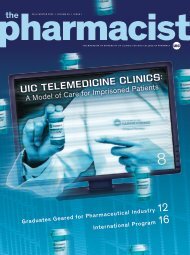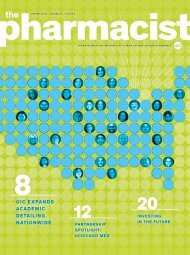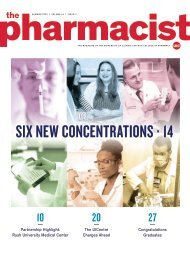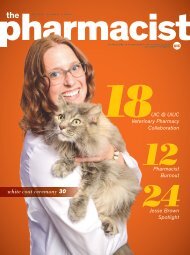The Pharmacist / Spring 2022 / Volume 44 / Issue 2
Magazine of the University of Illinois Chicago College of Pharmacy
Magazine of the University of Illinois Chicago College of Pharmacy
Create successful ePaper yourself
Turn your PDF publications into a flip-book with our unique Google optimized e-Paper software.
Dr. Michael Federle<br />
This is a<br />
personal<br />
odyssey for<br />
me, and I’ll<br />
openly admit<br />
there’s a<br />
selfish need<br />
to solve this<br />
puzzle.<br />
continues to inform ambitious drug discovery efforts at<br />
UIC and around the world.<br />
“We’re not discovering any drugs tomorrow, but we’re<br />
laying a foundation others can build upon,” says Mankin,<br />
a professor at the college’s Center for Biomolecular<br />
Sciences. “When you find something no one before<br />
you knew, it’s a thrill, and there’s a feeling we’re doing<br />
something immortal in the building of human knowledge.”<br />
UNPACKING THE MYSTERIOUS LIVES<br />
OF BACTERIA<br />
Dr. Michael Federle calls his ongoing study of bacteria<br />
a “persistent obsession,” one fueled by the spellbinding<br />
nature of bacteria’s active citizenship in our bodies.<br />
“You can take one test tube of bacteria and find millions<br />
of mutants worth studying,” says Federle, a professor of<br />
pharmaceutical sciences.<br />
After years of suspecting that bacteria were “colluding<br />
and coordinating” in the human body, Federle and his<br />
lab team continue to unearth promising findings about<br />
the intricate worlds bacteria build inside our bodies.<br />
<strong>The</strong>y have, for instance, helped discover the language<br />
bacteria use to communicate with one another and<br />
recently found that bacteria also alter their surface<br />
composition to manipulate the body’s immune system.<br />
This pioneering work sets the stage for the development<br />
of drug leads to intervene with this networking and<br />
unlocks opportunities for new therapies that can diffuse<br />
conspiring bacteria.<br />
“As we identify new targets in bacteria, we can then create<br />
more precise therapies to combat them,” Federle says.<br />
He acknowledges it won’t be easy, though, as bacteria<br />
remain an elusive adversary for scientific researchers<br />
like himself.<br />
“This is a personal odyssey for me, and I’ll openly admit<br />
there’s a selfish need to solve this puzzle,” Federle says.<br />
SEEKING SOLUTIONS FOR OVARIAN CANCER<br />
While doing research review work for the U.S.<br />
Department of Defense, Dr. Maria Barbolina has<br />
listened to personal stories of women staring down their<br />
mortality and battling ovarian cancer, one of the most<br />
unforgiving, deadliest cancers. Some, like Barbolina,<br />
are in their 40s and mothers of young children.<br />
“It hits home,” says Barbolina, an associate professor<br />
in the Department of Pharmaceutical Sciences.<br />
In comparison to other cancers<br />
impacting women, ovarian cancer<br />
struggles to gain its share of attention.<br />
While some 330,000 U.S. women<br />
receive a breast cancer diagnosis<br />
each year, far fewer–about 20,000–<br />
hear they have ovarian cancer.<br />
“But this is not such a rare, uncommon<br />
disease when you meet the people<br />
facing it,” Barbolina says. “I see the real<br />
people behind these statistics and I’m<br />
determined to do something about it.”<br />
Since arriving at UIC in 2008, Barbolina<br />
has devoted substantial research attention<br />
to understanding ovarian cancer’s basic<br />
biological activity, which continues to miff<br />
scientific investigators. Her most promising<br />
work includes repurposing a drug<br />
originally developed for neurodegenerative<br />
diseases. Early findings suggest this<br />
therapeutic may improve prognoses<br />
for ovarian cancer patients resistant to<br />
traditional chemotherapy agents.<br />
“It’s exciting because I know what that would<br />
mean to women like those I’ve met and their families,”<br />
Barbolina says.<br />
EMBRACING RESEARCH AS<br />
AN ANTIDOTE TO PATIENT NEEDS<br />
Seeing vulnerable patients daily as a clinician at UIC,<br />
Dr. Karen Sweiss understands better than most the<br />
urgent need for pragmatic research to drive change.<br />
“I see every day how our patients are counting on<br />
us, and that pushes me to ask important research<br />
questions,” says Sweiss, a clinical assistant professor in<br />
the Department of Pharmacy Practice.<br />
Consider Sweiss’s work around melphalan, a<br />
chemotherapy drug commonly used in treating<br />
multiple myeloma. When Sweiss’s group first began<br />
investigating melphalan pharmacokinetic (PK)<br />
variability through retrospective studies, they noted<br />
high variability in drug exposure in patients with lower<br />
hemoglobin and creatinine clearance.<br />
<strong>The</strong> group then published its experience<br />
with performing real-time melphalan<br />
PK testing to allow for rapid-dose<br />
modification based on PK estimations.<br />
Dr. Karen Sweiss<br />
16 THE PHARMACIST PHARMACY.UIC.EDU








